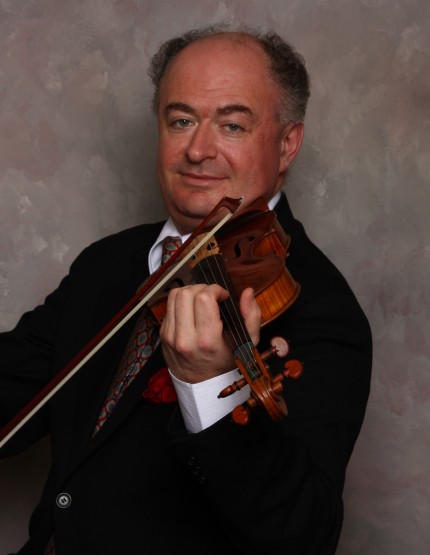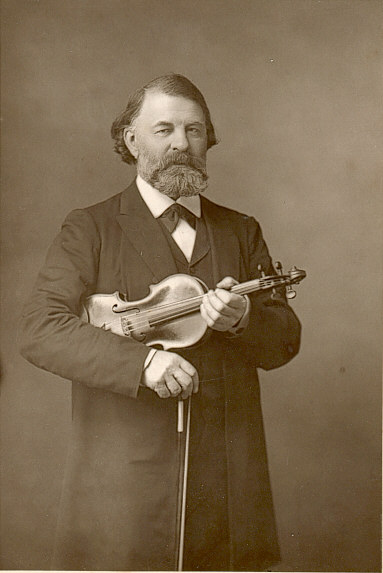Violinist Ilya Kaler brings a scholar’s evolving perspective to Brahms

With the possible exception of Beethoven’s Violin Concerto, few of the greatest works in that genre are as interpretively difficult to pull off successfully than that of Johannes Brahms.
Yes, with the wealth of gifted string soloists around, one hears many good, solid performances of Brahms’ Violin Concerto, yet rarely a truly memorable one. Perhaps it’s because the work is so symphonically structured, that even with its brilliant finale, Brahms’ mix of craggy drama and dark introspection is a tricky balancing act for even the finest artists.
Next Sunday Ilya Kaler will take his turn, tackling the Brahms concerto with conductor Alan Heatherington and the Ars Viva Symphony Orchestra in Skokie.
“The piece presents a number of problems for a soloist,” said the Moscow-born violinist earlier this week. “One of them, to put it simply, is just being heard. The concerto is scored very richly and with the violin almost in the same register as strings and woodwinds and so forth, that requires a certain level of sound projection.
“Also because it’s so symphonic, it requires constant thinking musically in big arches. There are a lot of figurations and passagework that are flourishes, and one has to think in a terms of a very long line to make sense of them.”
Kaler, a violin professor at DePaul University’s School of Music and an Ars Viva member, seems better equipped than most to tackle Brahms’ challenges. Born in Moscow to a family of musicians, he has enjoyed a distinguished career as teacher and performer. Kaler has won—remarkably—the Gold Medal at the three leading international violin competitions: the Tchaikovsky, Sibelius and Paganini. He has performed with many of the top Russian and U.S. orchestras and logged time as a professor in Bloomington and Rochester before taking up his present post in Chicago.
As much as he admires Brahms’ genius in creating this beloved work, as a violinist he also appreciates the essential part that its dedicatee and first soloist, Joseph Joachim, had in bringing it to life.

Kaler has found it a fascinating experience to compare Brahms’ original manuscript with the final edition we know today. While the orchestral part is largely the same, the finished concerto has significant changes to the solo part, made with the advice and input that the composer sought from Joachim, then one of the most celebrated violinists in the world.
“There are differences in articulation and certain passagework,” said Kaler. “The whole general conception of the original version was that of a pianist, not a violinist. The textures, the way the passages are arranged, even sometimes the very keys in which they are written are more the ideas of a pianist. Thanks to Joachim, the final version we have today is more palatable and much more playable.”
Perhaps Joachim’s most individual contribution to the Brahms’ concerto are his cadenzas, which Kaler will use, and which he considers a remarkable achievement.
“They are so great,” Kaler enthuses. “When he wrote a cadenza, Joachim had this unique capability to really integrate himself into the style of a composer. And, of course, his closeness to Brahms, and his affinity for his style was well known.
“His cadenza sounds like Brahms himself would have written it. Except you immediately can sense that it was written by a violinist, and a great one, because of the profound knowledge of the capabilities of the instrument, both virtuosic and expressive.”
Kaler first performed the Brahms concerto as a 16-year-old in Russia and played it frequently during his early years as a young musician. It remains a central work in his concert repertoire today and one that he has recorded (with the Schumann concerto) for the Naxos label. Kaler’s daunting discography also encompasses concertos of Paganini, Shostakovich, Szymanowsky, Tchaikovsky, Dvorak, and Glazunov, sonatas by Brahms and Schumann, the complete Bach sonatas and partitas and even a Suite by Taneyev.
As a young man, the DePaul professor said he was inevitably influenced by recordings and live performances by the great Russian violinists of the day (having Leonid Kogan as a teacher obviously had an impact as well). “At that time I didn’t have a very independent view of things,” says Kaler. “I did not analyze the score to the extent I do now.”
And while he hasn’t consciously modified his approach to Brahms’ music, he believes there has been a natural evolution with the passing years and further examination of the score. “Sometimes passages that you thought were the most important in a particular section are simply ornamental or play some other function,” he says. “And sometimes certain thematic material appears in an unexpected place and you thought it was simply an ornamental passage. This piece, like any truly great piece is full of surprises.”
One intentional change is that he has adopted fleeter tempos than many soloists, particularly in the long opening movement. “Now I tend to emphasize a little bit more the Classical part of the concerto,” he says. “Which of course doesn’t take anything away from the truly Romantic content of it. But I believe that the structure of this piece is much more important than the kind of self-indulgent dwelling and sins that I was guilty of when I was very young.”
Kaler believes that as long as he plays the Brahms Concerto, with its myriad of beauties and intricacies, his performances will continue to evolve and develop in a work he clearly loves.
“You know, it’s like doing photography with different sorts of lighting,” he says. “You see things you knew were there before but you see them now in a different kind of light. It’s kind of a forensic analysis, I would say.”
Ilya Kaler performs Brahms’ Violin Concerto with Alan Heatherington and the Ars Viva symphony orchestra 4:30 p.m. Sunday at the North Shore Center for the Performing Arts in Skokie. The all-Brahms program will also include the Symphony No. 3 and Variations on a Theme by Haydn. www.arsviva.org; 847-673-6300
Posted in Articles


Posted Nov 14, 2009 at 12:36 pm by Steven
Wait, Brahms wrote a violin concerto?? Gotta go to more concerts!